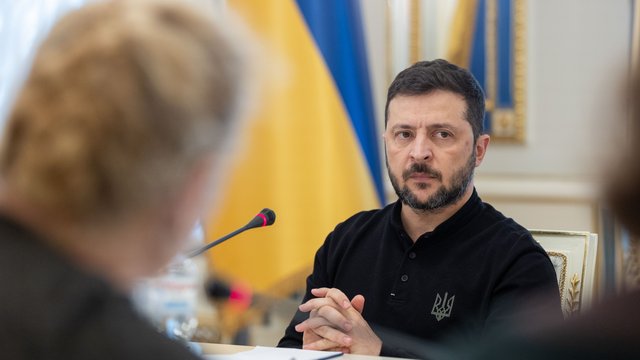Zelenskyy's trust level steady, but only 25% want post-war presidency – KIIS

The level of trust in Ukrainian President Volodymyr Zelenskyy has practically not changed compared to the first half of September 2025: currently 60% of Ukrainians trust him, 35% do not trust him, while in the first half of September the corresponding figures were 59% and 34%, according to the results of a study conducted by the Kyiv International Institute of Sociology (KIIS) from September 19 to October 5.
It is noted that after a decrease in trust between the beginning of May and the beginning of August (initially from 74% to 65% in early June and then to 58% in early August), stabilization has occurred and over the past two months the level of trust in the president has fluctuated within the margin of error. At the same time, although the level of trust is now lower than it was in May, it is higher than in December 2024.
At the same time, despite the fact that only 11% of Ukrainians believe that elections in Ukraine should be held now, that is, before the end of hostilities, only 41% of those surveyed believe that Zelenskyy should remain in politics after the war, and only 25% would like him to continue as president of Ukraine. In contrast, 36% of respondents expressed the opinion that it would be better for him to leave politics after the war. 14% want Zelenskyy to be prosecuted.
Among those who now fully trust Zelenskyy, the vast majority would like to see him as president after the war as well – 69%. Among those who rather trust, the figure is only 21%, and among those who do not trust at all or rather do not trust – only 3% and 2%, respectively.
"The share of those who see a given person as president after the war is not equivalent to an electoral rating. During elections, people choose between specific participants, so the composition of the candidates can determine the decision on who to vote for (for example, a certain person may not enjoy great trust, but be perceived as the best option among the available ones)," the press release on the results of the study notes.
At the same time, even fewer respondents would like Petro Poroshenko, the people’s deputy, the leader of the largest opposition faction European Solidarity in the Verkhovna Rada, the fifth president of Ukraine (2014-19), who is currently actively investing in national defense, to remain in politics. In total, 23% of Ukrainians believe that he should remain in politics, and only 9% of Ukrainians would like Poroshenko to take the post of president or prime minister after the war. Instead, 46% would like him to leave politics. 23% of respondents want Poroshenko to be prosecuted.
In total, 45% of respondents do not see either Zelenskyy or Poroshenko in politics after the war. Another 46% have a "polarizing" approach, when they see one person in politics, but would not like the other to remain in politics: 32% believe that Zelenskyy should remain in politics, but not Poroshenko, 14% would like the opposite. Only 9% answered that they would like both to remain in politics.
Some 32% of all respondents would like criminal prosecution of either Zelenskyy or Poroshenko, in particular, 5% spoke about the prosecution of both figures.
Executive Director of KIIS Anton Hrushetsky noted that Zelenskyy retains a fairly high level of trust in Ukrainian society and high legitimacy as the head of state for the period until the end of the war, but after that there is an expectation to see someone new in the position of president. "However, the request to see someone new in the position of president (or other top positions in the state) does not mean a desire for the current parliamentary opposition to come to power. During a full-scale war, many servicemen, volunteers, public figures, and central and local officials have proven themselves as true leaders and effective anti-crisis managers. A new generation of Ukrainian leaders is being tempered in the fire of war, and ordinary citizens are aware of this and are ready to give them a chance to prove themselves in politics after the war. Therefore, we see that in the case of both Zelenskyy (as a representative of the current government) and Poroshenko (as a representative of the opposition), many Ukrainians would like them to make way for new leaders," he commented. Hrushetsky also noted that quite a few Ukrainians demand public harsh punishment of politicians, which is a civilized approach that should be encouraged. "The current authorities need to understand that there is no demand among the public for the punishment of Poroshenko. At the same time, the ex-president’s team should also realize that there is no demand for the criminal prosecution of Zelenskyy," he stressed.
The study was conducted using the method of telephone interviews (CATI) based on a random sample of mobile phone numbers in all government-controlled regions of Ukraine among 1,008 respondents aged 18 and over. Formally, under normal circumstances, the statistical error of such a sample (with a probability of 0.95 and taking into account the design effect of 1.3) did not exceed 4.1% for indicators close to 50% and 1.8% - for indicators close to 5%. Under war conditions, in addition to the specified formal error, a certain systematic deviation is added, but the results obtained still retain high representativeness.


